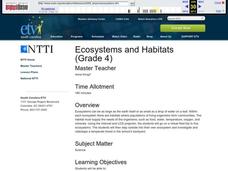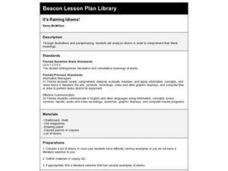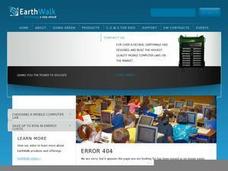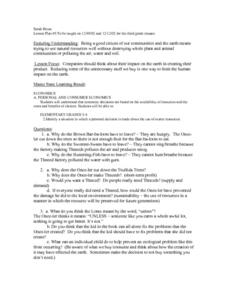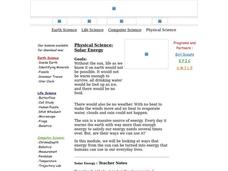Curated OER
Women and World War II
Students determine the influence of World War II on women's roles in society. Students research the answers to questions about how women were able to enter jobs that had not been open to them before the war and how this affected society....
Creative Chemistry
Making Ammonia - The Haber Process
In this fertilizer worksheet, students read background information about how farmers began using nitrogen compounds as fertilizer and how Fritz Haber developed an efficient process. Based on their reading, students complete 10 short...
Curated OER
The History of Maple Syrup
Students explore the process of harvesting maple syrup. In this science and history lesson, students make their own maple syrup and create a picture book that shows the Native American and American pioneer methods of making the syrup.
Curated OER
Using Soap Foam to Alter the Density of Plaster of Paris
Students determine the density of Plaster of Paris that has been prepared with a foam generated from dishwashing liquids and shampoo.
Curated OER
A Natural Habitat: What, How and Why
Students understand what a habitat is. They determine why a habitat is important to our environment no matter where it is located. Students observe and recognize natural habitats in their surroundings.
Curated OER
Let's Learn About Energy Sources
Second graders identify at least four energy sources through sensory experiences.
Curated OER
Ecosystems and Habitats
Fourth graders go on a virtual field trip to five ecosystems. They investigate and videotape a temperate forest in the school's backyard.
Curated OER
It's Raining Idioms!
Sixth graders analyze idioms and find examples from literature. They choose one idiom and finds pictures or draws pictures to show what it would mean if taken literally and what is it generally thought to mean.
Curated OER
Forest Products in the Classroom
Students make recycled paper as they discuss products we get from trees.
Curated OER
Traveling Nitrogen
Students demonstrate and understanding of the nitrogen cycle by taking roles and interacting with others in a simulation activity.
Curated OER
Ethanol
Young scholars explore how to fuel cars with corn and then test different items to explore the process of fermentation.
Curated OER
Chymosin Demonstration
Students perform a demonstration which provides an example of the use of a protein produced by biotechnology for making ice cream, custard, and cheese.
Curated OER
Design a Service Learning Activity
Students work together to design a service learning activity for their community that would benefit the Tijuana estuary. Using the internet, they research the elements of a service learning project and plan their's accordingly. They...
Curated OER
Science: Suddenly Snow
Students engage in snow-related activities during the first winter snowfall. After explaining the elements needed for it to snow, they preserve snowflakes on frozen slides and observe them under a microscope. Then, they write diamante...
Curated OER
Sustainable Agriculture
Students perform an experiment to find out if plants grow best when grown in soil with no fertilizer, with chemical fertilizers, or with compost that they have made themselves. Students discover how agriculture practices can benefit the...
Curated OER
Taming the Wild Aurochs
Fourth graders assess the development of animal husbandry, outline it in detail as well as arrange the steps in sequential order. In addition, they discuss how certain animals came to be domesticated, concentrate to research on one of...
Curated OER
Lake and Pond Study
Young scholars examine the habitat and community structure of a pond that could support Ospreys through games and worksheets. They then go on a field trip to a pond to evaluate the suitability of the pond as an Osprey habitat.
Curated OER
Germs and Microbes
Students observe how to clean their hands with antibacterial wipes or instant hand sanitizers. They discuss the steps to germ fighting and use reproducibles, fingerplays, and songs to reinforce that cleaning hands and fighting germs are...
Curated OER
Fishing Unit with Field Trip
Students complete a unit on the hobby of fishing. They assemble the line with the necessary equipment (hook, swivel, bobbers, weights, and lures.) They practice casting and discover what to do when they catch a fish. They follow with...
Curated OER
Create a Commercial
Young scholars apply their knowledge of the persuasive appeals by creating a commercial which uses one or more of the three appeals (logos, pathos, and ethos) in order to persuade. They also differentiate among the three appeals as used...
Curated OER
Ocean Currents
Students label the names, relative temperature, distribution, and direction of flow of major ocean currents on a world map. They also explore and model the natural forces that affect the movement of ocean currents through demonstrations...
Curated OER
Economics -- Third Grade
Third graders read the Dr. Seuss book The Lorax. In groups, they answer questions that are related to economics and distribution of goods. They also identify the environmental issues present in the book and perform a skit in front of the...
Curated OER
Solar Energy
Students investigate solar energy. They explore ways that energy from the sun can be turned into energy that humans can use in our everyday lives. In various experiments, they explore the effect of clouds and dust on photovoltaic energy...
Other popular searches
- Domestic Water Supply
- Water Supply and Demand
- Water Supply in Uganda
- Nyc Water Supply
- Limited Water Supply
- California Water Supply
- Cold Water Supply
- Water Supply Intake
- Earth's Water Supply







